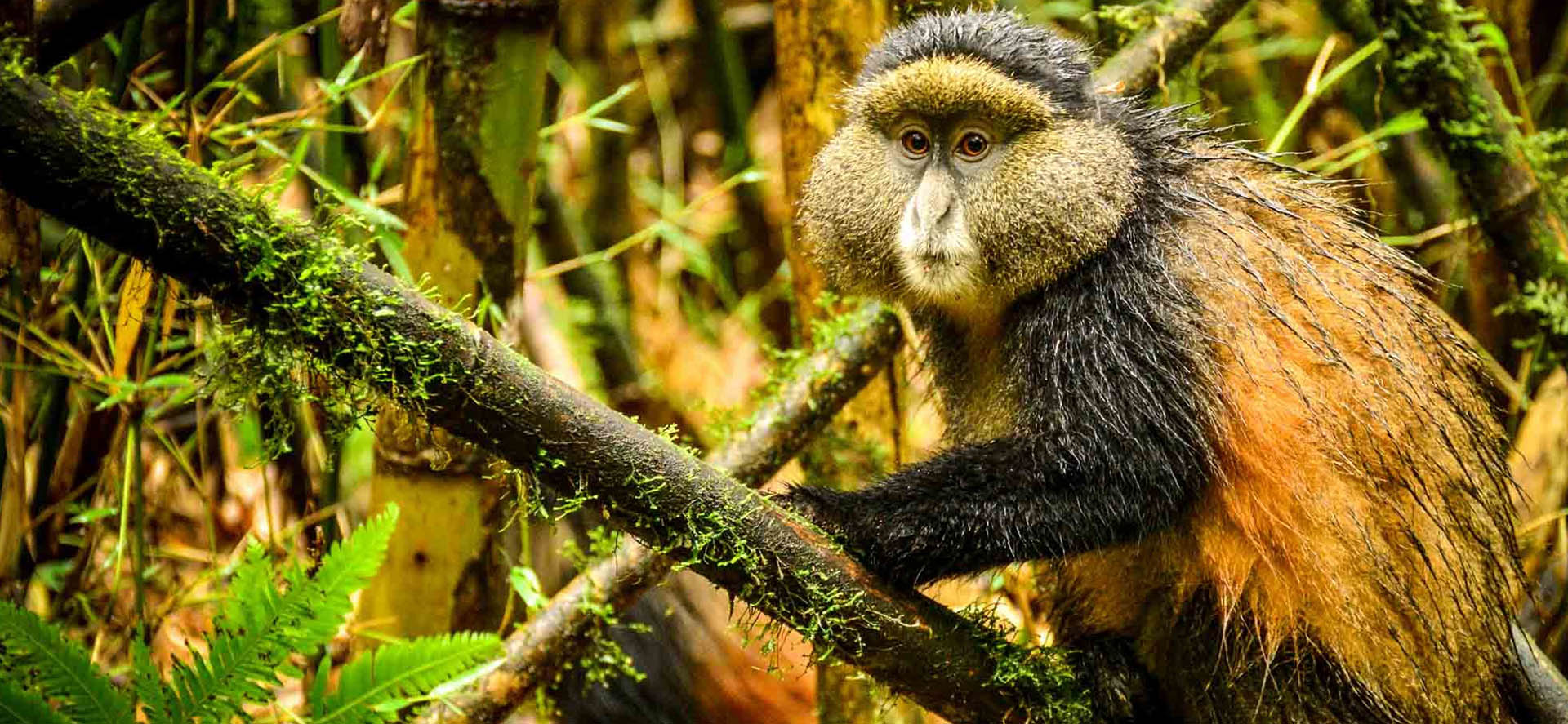- Adventure of a Lifetime
- +256 772 873106
- info@mtrwenzorisafaris.com

Sempaya Hot Springs
September 8, 2022
Fort Portal City
September 24, 2022Golden Monkey Tracking in Rwanda and Uganda
The golden monkey is a species of the old world monkey found in the Virunga volcanic mountains of Central Africa including four national parks that are Mgahinga in South Western Uganda, Volcanoes in North West Rwanda, Kahuzi Biega, and Virunga in the Eastern Democratic Republic of Congo(DRC). Golden monkeys are restricted to highland forests most especially near bamboo.
It used to be thought of as a subspecies of the blue monkey but the golden monkey has a golden orange patch on the upper flanks and back. It lives in social groups of up to 30 individuals and its diet mainly consists of bamboo, fruits, and leaves in most cases it also eats insects. The golden monkey is listed as endangered by the IUCN Red List.
Behavior and ecology
Golden monkeys can travel in various group sizes and have always been seen in small groups of three to 62 monkeys. Groups found at higher elevations tend to be smaller. According to one study carried out by some authors, golden monkeys are mostly seen in bamboo forests and they have suggested that this is their preferred habitat.
Golden monkeys are currently found in the Virunga mountains in Rwanda, Uganda and the Democratic Republic of Congo (DRC) and they have some unique characteristics that are, their nostrils face upwards unlike most monkeys where the nostrils point to the sides. They are a sub-species of the Sykes monkey also referred to as the Blue monkey, scientifically known as ‘Cercopithecus Mitis Kanditi’.
Where to see golden monkeys
Volcanoes National Park
This is found in Rwanda and there are two habituated troops of golden monkeys. The largest and most visited group lives around the slopes of Mount Sabyinyo with about 100 individuals. Other golden monkey troops can be found in Gishwati Forest Reserve while a small group is believed to be surviving in Nyungwe forest national park. Tourists should take note that golden monkey troops in Gishwati Forest Reserve and Nyungwe forest are not habituated so they are wild.
Mgahinga Gorilla National Park
This is found in South Western Uganda and in this park, there are two habituated golden monkey troops in Uganda, and this is the best place where to track these golden monkeys.
Golden monkey habituation experience also takes place in this national park and here tourists are allowed to spend four hours with the golden monkeys where they get the chance to observe and study these primates more about their lives alongside International researchers, experienced trackers, and ranger guides from the Uganda Wildlife Authority(UWA).
Virunga national park and Kahuzi Biega National park
These are found in the Democratic Republic of Congo(DRC) through golden monkey trekking is not yet fully opened to visitors in these national parks because of security reasons.
Tracking time
Golden monkey briefing starts as early as 7:30 am before entering the forest in search of these primates. The tracking takes about an hour and unlike mountain gorillas; these primates are located by looking out for fresh leftovers of bamboo shoots.
Due to their constant movements on top of trees, visitors are allowed to take photos using flash photography because sometimes it is very difficult to locate them but once they are seen, you need to follow them as they usually move from one tree to another. Their long tails help them to balance on the trees. Golden monkeys bring bamboo plants together and make nests where they sleep or rest after a long day
Golden monkeys are becoming extinct because the forests where they live have been tampered with by human settlement and agriculture by cutting down trees.
Cost of the permit
Golden monkey trekking in Mgahinga gorilla national park goes for USD100 for foreign no –residents and 100,000 Uganda shillings per person for East African residents.
Golden monkey habituation experience costs USD140 per person per trek and this helps the tourist to spend at least some time with these endangered species.
What to carry for golden monkey trekking?
Tourists are advised to carry good hiking shoes to help them in times when the ground is slippery for example during cold climatic conditions.
You are advised to carry enough food in form of packed lunch and enough drinking water. Insect repellent is a must as at any time you can find some insects along the way. Heavy jackets in case of heavy rains because the rain is unpredictable and can fall at any time.
Best Selling East Africa Safaris Tour Packages Combined with East Africa Trips
2 Days Chimpanzee Trekking Tour
3 Days Chimpanzee Trekking in Uganda
3 Days Murchison Falls Safari – Uganda





